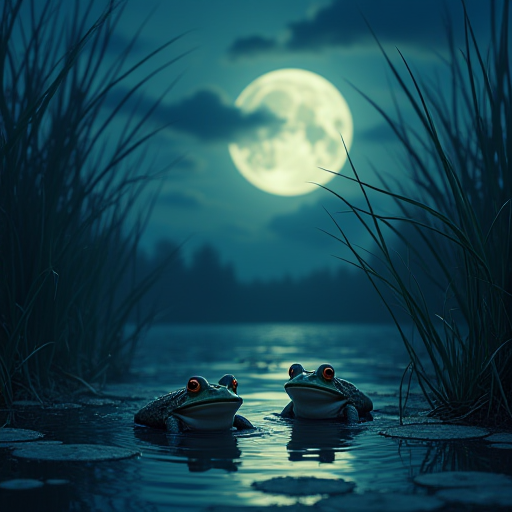
Why Do Frogs Croak at Night?
Frogs are fascinating creatures known for their distinct croaking sounds that often fill the night air. These vocalizations are most commonly heard during the warmer months and can be quite loud, especially near ponds, wetlands, and forests. But why do frogs croak at night? In this article, we will explore the reasons behind this behavior, delve into the science of frog calls, and uncover the ecological significance and evolutionary advantages of nocturnal croaking.
The Science of Frog Calls
Frog calls are produced by the rapid movement of air over the vocal cords, which vibrates the larynx. This process is often facilitated by the vocal sacs, which are thin membranes of skin that can inflate and amplify the sound. Different species of frogs have unique calls that can vary in pitch, duration, and volume.
Purpose of Croaking
-
Mating Calls: The primary reason frogs croak is to attract mates. Male frogs use their vocalizations to signal their presence and advertise their fitness to potential female partners. This is especially crucial during breeding season, when frogs gather in large numbers to reproduce.
-
Territorial Displays: Croaking also serves as a way for frogs to establish and defend their territory. By calling out, a frog can warn other males to stay away from its claimed area, reducing the chances of confrontation and competition.
-
Species Identification: Each frog species has a distinct call, which helps individuals identify members of their own species. This is particularly important in environments with high biodiversity, where multiple frog species may coexist.
Why Do Frogs Croak at Night?
Environmental Conditions
-
Temperature and Humidity: Frogs are ectothermic animals, meaning their body temperature is regulated by the environment. Nighttime typically offers cooler temperatures and higher humidity levels, which are more conducive to the frogs' physiology. The moist air at night helps prevent dehydration and supports the production of strong, sustained calls.
-
Reduced Predation: Many of the natural predators of frogs, such as birds and larger mammals, are less active at night. By croaking after dark, frogs reduce their risk of predation while communicating.
-
Less Acoustic Interference: Nighttime is generally quieter, with fewer competing sounds from other animals and human activity. This quieter environment allows frog calls to carry further, making it easier for potential mates to hear them.
Behavioral and Evolutionary Factors
-
Nocturnal Activity Patterns: Many species of frogs are naturally nocturnal, meaning they are most active during the night. This behavior is often driven by the need to avoid daytime predators and harsh sunlight, making nighttime the optimal period for breeding activities.
-
Evolutionary Adaptations: Over millions of years, frogs have adapted to croak at night as a successful strategy for reproduction. Those that utilized nighttime calling had better reproductive success, passing on this advantageous trait to future generations.
Ecological Significance
Frog croaking plays a critical role in maintaining the balance of ecosystems. By facilitating mating and territorial behaviors, frogs contribute to the maintenance of healthy populations and the continuation of their species. This, in turn, affects the food web, as frogs serve as both predators and prey in their habitats.
Furthermore, the presence and health of frog populations are considered indicators of environmental quality. Frogs are sensitive to changes in the environment, such as pollution and habitat destruction, making their calls an important ecological signal.
Conclusion
Frogs croak at night primarily to attract mates and establish territories, driven by a combination of environmental conditions and evolutionary factors. Nighttime provides an optimal environment for these activities due to cooler temperatures, higher humidity, and reduced predation risks. Understanding why frogs croak at night not only enriches our appreciation of these amphibians but also highlights the intricate connections within ecosystems that support biodiversity and ecological health. As night falls and the symphony of croaks begins, it stands as a reminder of the natural world's complexity and the fascinating behaviors that have evolved over time.
